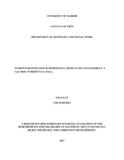| dc.description.abstract | Urban solid waste menace in the developing countries has reached alarming proportions as the municipal authorities are always overwhelmed by the amount of waste generated each day. In most cultures of these countries, domestic chores which generate much of this solid waste are undertaken by women, and so they could be critical partners in solving this crisis. This study therefore sought to reveal the contribution of women in solid waste management both at the household and group levels in Malindi town, Kenya. The involvement of children in waste disposal by the women at the house level was also assessed.
The study was based on four specific objectives: to examine the characteristics of the women sampled, to assess the level of household solid waste management amongst women, to estimate the level of awareness on solid waste management amongst women and to assess the level of participation by women in solid waste management.
The research was anchored on two theories: Structural Functionalism and Habitus theory while adopting the descriptive research design where household survey targeting women was carried out. Focus group discussions were conducted and self-help group representatives provided information on women participation in the groups.
The study found out that, the majority of the women (48.4%) were in the age of between 30 -39 years and 60.3% reported to be married. The findings showed that most of the women residents interviewed (67.8%) earned less than Ksh. 5,000 per month and 56.7% lived in single rented houses. It was also established that 87.9% of the women interviewed were well aware of the dangers of pollution and diseases caused by poor waste disposal with 57.6% attributing this to the failure of the county government. At the household, it was established that 87.3% of the women sampled frequently involved children in waste disposal by tasking them to take waste to the bins. The study also found out that there were self-help groups that engaged in solid waste management in the town though they were ill equipped and lacked proper training to offer effective services.
In conclusion, it was clear that the county government of Malindi was constrained in offering solid waste services adequately warranting community participation towards this end. There is potential in the women co-operation in solid waste management in the town as they were of an active age that could participate in community work. Furthermore due to their low incomes, they would be willing to work in the existing self help groups to earn some money. Efforts ought to be made to encourage formation of more groups and fund the existing ones to counter the waste menace through this partnership. Women require to be equipped with modern skills on solid waste management which they would in turn pass over to their children whom they often involved in waste disposal. Households also need to be enlightened on solid waste management best practices such as recycling, reusing and composting in order to reduce waste at the source | en_US |



